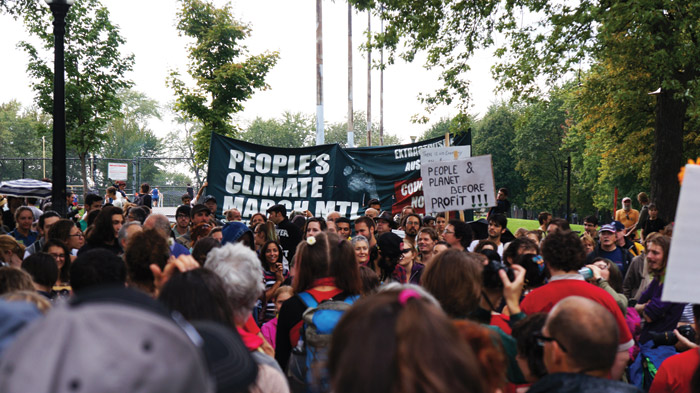I spent my summer scanning environmental news stories, specifically those related to climate change.I encountered many diffferent styles of writing: emotion-driven pleas to save the planet, despondent interviews bemoaning political inaction, and a fair share of info-graphics. Across all major news outlets of varying ideologies, climate change was a continuous talking point. As I saw when I was out this weekend in Montreal’s protest in solidarity with the People’s Climate March, there is a clear clamour for action at the grassroots level.
Exactly how and when we should address climate change remains contentious amongst journalists and academics, but few deny the need to tackle it. According to statistics from a study produced by several academics, 97 per cent of scientists acknowledge the existence of anthropocentric climate change. The National Oceanic and Atmospheric Administration (NOAA) announced that this summer has been the hottest recorded in more than 100 years, and studies in the journal Science reported that we are in the midst of the sixth “mass extinction” of life on Earth. More depressingly, the Intergovernmental Panel on Climate Change (IPCC) noted that a worldwide cut of 40 to 70 per cent in carbon emissions is needed by midcentury in order to avoid climate calamity, which the IPCC defined as surpassing a global temperature of two degrees Celsius above pre-industrial levels.
Despite these clear facts, governments have responded very differently. The Obama administration took a major step this past June when it announced its plan to cut U.S. emissions from coal-fired power plants by 30 per cent by 2030. Since 2008, British Columbia has employed a carbon tax that is generally seen as successful—The Globe and Mail eported: “the shocking truth about BC’s carbon tax: it works.” California has a cap and trade system for carbon, and Germany soon plans to obtain 30 per cent of its power from renewables.
Not all governments have exercised such prudence. Australia repealed its carbon tax in July in a rare and regressive case of a developed country actively dismantling its climate policy. For Canada’s Stephen Harper, climate change has not been listed as a top priority.
Moving forward, regardless of these disparate initiatives, a global carbon consensus is still desperately needed. Emission cuts in some parts of the world will be rendered useless if other countries fail to comply with global reductions. In the buildup to the much-anticipated United Nations (UN) Paris 2015 Climate Summit, UN Secretary-General Ban Ki-moon is convening a UN climate conference in New York on Tuesday, September 23, and is prompting leaders to “champion an ambitious vision anchored in action that will enable a meaningful global agreement in 2015.”
Given the aforementioned positive governmental initiatives, there is hope that world leaders will avoid the patchy outcomes of the Kyoto Protocol and the wholly underwhelming conclusion of the 2009 Copenhagen Climate Change Conference. Even so, a report from the Massachusetts Institute of Technology (MIT) predicts that the deal reached at the UN’s 2015 Paris Climate Summit will “bend the curve of global emissions but will not put the globe on the path consistent with commonly stated long-term climate goals.”
To fight inertia and catalyze political action in the UN headquarters, hundreds of thousands of demonstrators from 150 countries took to the streets on Sunday as part of the largest climate march in history: The People’s Climate March. In New York City alone, over 300,000 people turned up to rally in solidarity. Montreal’s climate march brought out a mix of concerned citizens donning small green felt hearts, reminiscent of the red squares sported in Quebec’s 2012 student protests against tuition hikes. Demonstrators carried signs expressing an emphatic narrative that encourages a reassessment of the neoliberal economic model and the attainment of dignity for all through climate justice.
On the streets, without the rolling and rattling of my summer’s media finds in my head, climate change is more than a scientific consensus, more than a social movement; it’s a sentiment ,and it’s definitely not silent. The worldwide People’s Climate March represents an important step in the climate movement, but the march certainly isn’t over. Though what is to politically materialize from the summit remains elusive, on the people’s side, the momentum is there. With any luck, the march will inject some noise into the silence of international consensus. If not, then we must seriously assess alternatives. We have an enormous opportunity right now, and I truly hope it’s not squandered, from the bottom of my green-felt heart.
Lauren Wray









